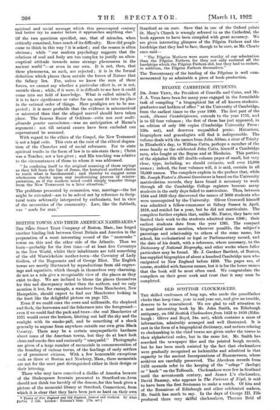BRITISH TOWNS Als13 THEIR AMERICAN NAMESAKES.* • Tau State Street
Trust Company of Boston, Mass., has forged
another binding link between Great Britain and America in the preparation of a most interesting record of the " namesake " towns on this and the other side of the Atlantic. Thus we learn—probably for the first time—of at least five Coventrys in the New World, whilst their inhabitants are told something of the old Warwickshire mother-town—the Coventry of Lady Gixliva, of the Huguenots and of George Eliot. The English towns are mostly illustrated by reproductions from old engrav- ings and aquatints, which though in themselves very charming, do not as a rule give a recognizable view of the places as they exist to-day. We are inclined to blame the places themselves for this sad discrepancy rather than the authors, and we only mention it lest, for example, a wanderer from Manchester, New Hampshire, should expect to find our Manchester looking in the least like the delightful picture on page 121.
Even if we could coax the cows and milkmaids, the shepherd and flock, the horseman and the fishermen into the foreground— even if we could find the park and trees—the real Manchester of 1921 would cover the horizon, blotting out half the sky and the sunlight with its smoke-pall, and be something of a shock generally to anyone from anywhere outside our own grim Black Country. There may be a certain unsympathetic hardness about some of the American towns, but they do at least look clean and smoke-free and eminently " unsqualid." Photographs are given of a large number of memorials in commemoration of the founding of various towns, of the landings of early settlers or of prominent citizens. With a few honourable exceptions such as those at Boston and Newbury, Mass., these memorials are not for the most part distinguished either in their design or their lettering.
Those who may have conceived a dislike of America because of the Shakespeare fountain presented to Stratford-on-Avon should not think too harshly of the donors, for this book gives a picture of the memorial library at Stratford, Connecticut, from which it is clear that they have been just as hard on their own
• Town of New England and Old England, Ireland and SeoUand. By Allan Forbes. 2 vols. London: Putnam's Sons. [75s. net.]
Stratford as on ours. Save that in one of the Oxford prints St. Mary's Chinch is wrongly referred to as the Cathedral, the book appears to have been compiled with great accuracy. We are given interesting glimpses of the Pilgrim Fathers and the hardships that they had to face, though to be sure, as Mr. Choate once said-
" The Pilgrim Mothers were more worthy of our admiration than the Pilgrim Fathers, for they not only endured all tho hardships which the Pilgrim Fathers did, but they had to endure, in addition, the Pilgrim Fathers themselves."
The Tercentenary of the landing of the Pilgrims is well com- memorated by so admirable a piece of book-production.


































 Previous page
Previous page